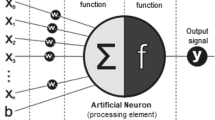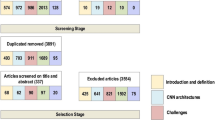Abstract
In the social Web era, crowdfunding has become an increasingly important channel for entrepreneurs to raise funds from the crowd for their start-up projects. Previous studies have examined various factors, such as textual information of projects and social capital of investors. However, multimedia information on projects such as audio information was rarely studied for analysing crowdfunding successes. This paper designs a novel audio analytics-based deep learning framework that can extract audio features to predict the fundraising outcomes of these projects. In the proposed framework, we suggest transfer learning to train our models, and multi-task learning to extract the deep features of audios. With the proposed features, our model achieves an 8.28% improvement in F1 and a 7.35% AUC comparing to baselines.






Similar content being viewed by others
Notes
Empirically, we found that splitting an individual set for pre-training would help the system’s generalization ability.
References
Gerber EM, Hui J (2013) Crowdfunding: motivations and deterrents for participation. ACM Trans Comput Hum Interact 20(6):34
Kaminski J, Jiang Y, Piller F, Hopp C (2017) Do user entrepreneurs speak different? Applying natural language processing to crowdfunding videos. In: Proceedings of the 2017 CHI Conference Extended Abstracts on Human Factors in Computing Systems, pp 2683–2689
Etter V, Grossglauser M, Thiran P (2013) Launch hard or go home!: predicting the success of kickstarter campaigns. In: Proceedings of the First ACM Conference on Online Social Networks, pp 177–182
Lai C, Lo P, Hwang S (2017) Incorporating comment text into success prediction of crowdfunding campaigns. In: Proceedings of the 2017 Pacific Asian Conference on Information Systems (PACIS)
Zhou MJ, Lu B, Fan WP, Wang GA (2018) Project description and crowdfunding success: an exploratory study. Inf Syst Front 20(2):259–274
Dey S, Duff B, Karahalios K, Fu W (2017) The art and science of persuasion: not all crowdfunding campaign videos are the same. In: Proceedings of the 2017 ACM Conference on Computer Supported Cooperative Work and Social Computing, pp 755–769
Koch J, Siering M (2015) Crowdfunding success factors: the characteristics of successfully funded projects on crowdfunding platforms. In: Proceedings of the 23rd European Conference on Information Systems
Burtch G, Ghose A, Wattal S (2013) Cultural differences and geography as determinants of online pro-social lending. Manag Inf Syst Quart 14(21):14–21
Lee S, Lee K, Kim H (2018) Content-based success prediction of crowdfunding campaigns: a deep learning approach. In: Companion of the 2018 ACM Conference on Computer Supported Cooperative Work and Social Computing, pp 193–196
Kim J, Cho D, Lee B (2016) The mind behind crowdfunding: an empirical study of speech emotion in fundraising success. In: Proceedings of the 2016 International Conference on Information Systems (ICIS)
Karpathy A, Toderici G, Shetty S, Leung T, Sukthankar R, Fei-Fei L (2014) Large-scale video classification with convolutional neural networks. In: Proceedings of the IEEE Conference on Computer Vision and Pattern Recognition, pp 1725–1732
Chen T, Xu R, He Y, Wang X (2017) Improving sentiment analysis via sentence type classification using BiLSTM-CRF and CNN. Expert Syst Appl 72:221–230
Schneider S, Baevski A, Collobert R, Auli M (2019) wav2vec: unsupervised pre-training for speech recognition. Proc Interspeech 2019:3465–3469
Ordanini A, Miceli L, Pizzetti M, Parasuraman A (2011) Crowd-funding: transforming customers into investors through innovative service platforms. J Service Manag 22(4):443–470
Greenberg MD, Pardo B, Hariharan K, Gerber E (2013) Crowdfunding support tools: predicting success and failure. In: CHI'13 Extended Abstracts on Human Factors in Computing Systems, pp 1815–1820
Du Q, Fan W, Qiao Z, Wang G, Zhang X, Zhou M (2015) Money talks: a predictive model on crowdfunding success using project description. In: Proceedings of the 2015 Americas Conference on Information Systems (AMCIS)
Yuan H, Lau RY, Xu W (2016) The determinants of crowdfunding success: a semantic text analytics approach. Decis Support Syst 91:67–76
Cheng C, Tan F, Hou X, Wei Z (2019) Success prediction on crowdfunding with multimodal deep learning. In: Proceedings of the Twenty-Eighth International Joint Conference on Artificial Intelligence (IJCAI), pp 2158–2164
Fan-Osuala O, Zantedeschi D, Jank W (2018) Using past contribution patterns to forecast fundraising outcomes in crowdfunding. Int J Forecast 34(1):30–44
Yu PF, Huang FM, Yang C, Liu YH, Li ZY, Tsai CH (2018) Prediction of crowdfunding project success with deep learning. In: 2018 IEEE 15th International Conference on e-Business Engineering (ICEBE), pp 1–8
Mollick E (2014) The dynamics of crowdfunding: an exploratory study. J Bus Ventur 29(1):1–16
Jung EJ, Susarla A, Sambamurthy V (2014) Evolutionary fundraising patterns and entrepreneurial performance in crowdfunding platforms. In: Proceedings of the 2014 International Conference on Information Systems (ICIS)
Xu A, Yang X, Rao H, Fu WT, Huang SW, Bailey BP (2014) Show me the money!: An analysis of project updates during crowdfunding campaigns. In: Proceedings of the SIGCHI Conference on Human Factors in Computing Systems, pp 591–600
Beier M, Wagner K (2015) Crowdfunding success: a perspective from social media and e-commerce. In: Proceedings of the 2015 International Conference on Information Systems (ICIS)
Kim J, Park J (2017) Does facial expression matter even online? An empirical analysis of facial expression of emotion and crowdfunding success. In: Proceeding of the 2017 International Conference on Information Systems (ICIS)
Ferrary M, Granovetter M (2009) The role of venture capital firms in Silicon Valley’s complex innovation network. Econ Soc 38(2):326–359
Choi K, Fazekas G, Sandler M, Cho K (2017) Transfer learning for music classification and regression tasks. In: Proceedings of the 2017 International Society for Music Information Retrieval Conference (ISMIR)
Pan SJ, Yang Q (2010) A survey on transfer learning. IEEE Trans Knowl Data Eng 22(10):1345–1359
Hershey S, Chaudhuri S, Ellis DP, Gemmeke JF, Jansen A, Moore RC, Plakal M, Platt D, Saurous R, Seybold B, Slaney M, Slaney M, Weiss R, Wilson K (2017) CNN architectures for large-scale audio classification. In: 2017 IEEE International Conference on Acoustics, Speech and Signal Processing (ICASSP), pp 131–135
Evgeniou T, Pontil M (2004) Regularized multi-task learning. In: Proceedings of the Tenth ACM SIGKDD International Conference on Knowledge Discovery and Data Mining, pp 109–117
Collobert R, Weston J (2008) A unified architecture for natural language processing: deep neural networks with multitask learning. In: Proceedings of the 25th International Conference on Machine Learning, pp 160–167
Seltzer ML, Droppo J (2013) Multi-task learning in deep neural networks for improved phoneme recognition. In: IEEE International Conference on Acoustics, Speech and Signal Processing (ICASSP), pp 6965–6969
Valin JM (2018) A hybrid DSP/deep learning approach to real-time full-band speech enhancement. In: International Workshop on Multimedia Signal Processing
Rosen DE, Purinton E (2004) Website design: viewing the web as a cognitive landscape. J Bus Res 57(7):787–794
Wilson AC, Roelofs R, Stern M, Srebro N, Recht B (2017) The marginal value of adaptive gradient methods in machine learning. In: Advances in Neural Information Processing Systems, pp 4148–4158
Keskar NS, Socher R (2017) Improving generalization performance by switching from adam to sgd. arXiv: 1712.07628
Acknowledgements
This work was supported in part by the National Natural Science Foundation of China (Grant No. 71771212, U1711262).
Author information
Authors and Affiliations
Corresponding author
Additional information
Publisher's Note
Springer Nature remains neutral with regard to jurisdictional claims in published maps and institutional affiliations.
Rights and permissions
About this article
Cite this article
Shi, J., Yang, K., Xu, W. et al. Leveraging deep learning with audio analytics to predict the success of crowdfunding projects. J Supercomput 77, 7833–7853 (2021). https://doi.org/10.1007/s11227-020-03595-2
Accepted:
Published:
Issue Date:
DOI: https://doi.org/10.1007/s11227-020-03595-2




